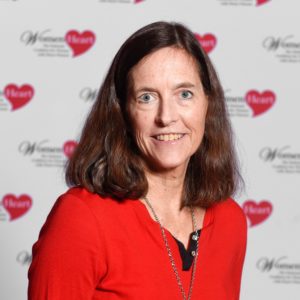 When heart failure struck, I was dumbfounded. I never felt any pain. I was the picture of health. My father and uncle both died of heart failure, but we always attributed it to excess weight, smoking, and alcohol – none of which were part of my life. But then I received that unnerving diagnosis. I survived because I had abundant assistance. Not just traditional support but doctors, nurses, rehab, family, friends and even strangers. The latter played a role I didn’t understand even existed until I began living with heart failure. I had allies in my battle – other women living with heart disease.
When heart failure struck, I was dumbfounded. I never felt any pain. I was the picture of health. My father and uncle both died of heart failure, but we always attributed it to excess weight, smoking, and alcohol – none of which were part of my life. But then I received that unnerving diagnosis. I survived because I had abundant assistance. Not just traditional support but doctors, nurses, rehab, family, friends and even strangers. The latter played a role I didn’t understand even existed until I began living with heart failure. I had allies in my battle – other women living with heart disease.
I was laying on a table in a hospital room. My recent chest x-ray had revealed nothing. Doctors were trying to determine why I was frequently short of breath. There were electrodes on my chest, wrists and ankles but I was not concerned, just curious about my situation. The technician entered the room, turned on the machine, and after what seemed like too long said, “I’ll be right back.” My biggest anxiety was that she didn’t completely close the door – I was naked and felt exposed.
A doctor came rushing into the room. With no preamble he announced, “we cannot do this test, it would kill you.” He then focused on changing the order to get insurance coverage.
Enraged that he didn’t seem interested in expounding on my condition that could be determined before any testing, and bewildered how a simple test could kill anyone, I asked for information. Then he moved his thumb and finger a few inches apart and his right and left arms a few feet from each other. He was demonstrating how my heart was beating versus how it should be beating. I bombarded him with questions. He advised me to see a cardiologist as soon as possible. He said we could have an appointment tomorrow when he would answer my questions. But I had no intention of seeing any doctor who would diagnose someone with heart failure and send them home without consultation.
I sat in my car sobbing. I had driven myself to the hospital, but I hadn’t thought to ask if it was OK to drive myself home. I needed to talk to someone, so I called my sister. Our father had died one year ago. He had multiple health challenges including heart failure. My sister didn’t know what to say to me, so she started looking up “heart failure” online. She discovered a group of women living with heart disease who met monthly at the hospital where I was parked and shared the information about WomenHeart.
My father’s cardiologist saw me the next day. He assured me that with medicine I would live a ‘fairly normal” life. I started taking numerous medicines. One, that was supposed to be the best, made me sick. I took an alternative drug but I noticed tingling in my fingers and toes and was starting to lose my peripheral vision. My doctor said my weak heart couldn’t pump blood well enough to supply those small capillaries and to continue.
Days later, while taking a shower I suffered a stroke. I received tissue plasminogen activator (tPA) within two hours, I was weak but deficit free. Within a week, I was discharged from the hospital. I began walking with two canes, then one, then none. As I recovered, I searched for answers. What caused my stroke? Then two months after my stroke, I developed left-sided deficits. I had drop foot and frozen shoulder. My cardiologist scheduled a stress echo; the test I had been told three months ago would kill me. As I pedaled the exercise bike as hard as I could, my doctor stopped me. His tone was kind, but his words were painful. “I can tell you’re trying as hard as you can, but your heart can’t do it. You need to meet with a transplant doctor.”
I had talked friends’ and family’s ears off trying to come to terms with my diagnosis and determine what to do next. My sister reminded me about WomenHeart. I attended a meeting. I shared my story. I cried. I listened to the stories of other women who were also facing heart health challenges. I finally no longer felt alone.
Over the next two years, I lived with worsening heart failure. Doctors helped me physically. Friends and family helped me day-to-day. I could not have survived without all this crucial assistance. Yet doctors, friends, and family did not really understand what I was going through. The support I received being part of WomenHeart was equally essential.
Living with a chronic illness is trying at times. While those around me watch in sympathy and have a secondhand concept of what my life is like, I find it easier to discuss my illness with other people who do not know me as well but live with similar health challenges. I obtain empathy and a shared sense of journey. These conversations help me better cope with my situation and give me more of a sense of control. I can be honest about being frightened and angry without scaring or worrying the ones I love.
In the past six years, I have rejected my transplanted heart and learned I had a second stroke (of which I was unaware). Tennis playing and running have been replaced in my life by living with a lifelong illness. I see various doctors to help maintain my physical well-being. I attend WomenHeart meetings and stay connected with the women who help me maintain my emotional well-being. It is reassuring to know there are women in my life who are on a similar challenging journey. They support me when I need encouragement, celebrate successes with me and truly appreciate the triumph I feel. They listen willingly – even when the story is pretty much the same every time.
This is not a path I could walk alone. Now that I have reached a stable state, every day and in some way, I am reminded that my health remains compromised. My friends and family don’t need to continually hear about that, but sometimes I still want to dwell on or vent about it. WomenHeart members continue to be there for me whether I am frustrated, angry, apprehensive or thankful. It is comforting to have somewhere to go when living with a chronic condition.
See Maureen’s video as part of the How We Fight campaign, answering “What should I do if my heart failure symptoms worsen?”




